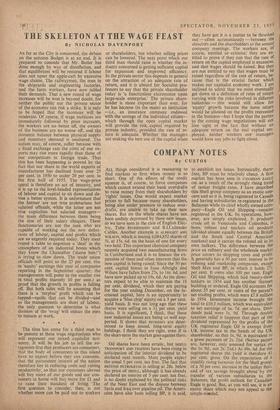THE SKELETON AT THE WAGE FEAST
By NICHOLAS DAVENPORT
As far as the City is concerned, the debate on the autumn Budget is at an end. It is prepared to concede that Mr. Butler has done enough by way of disinflation, and that equilibrium will be restored if labour does not upset the apple-cart by excessive wage claims. The railwaymen, the men in the shipyards and engineering factories, and the farm workers, have now tabled their demands. That a new round of wage increases will be won is beyond doubt, for neither the public nor the private sector of the economy can risk a strike. It is only to be hoped that the increases will be moderate. Of course, if wage increases are immediately followed by price increases, the workers are no better off, the owners of the business are no worse off, and the domestic balance between physical supply and monetary demand is unaltered. The nation may, of course, suffer betause with a fixed exchange rate the costs of our ex- ports may rise more rapidly than those of our competitors in foreign trade. That this has been happening is proved by the fact that our share in the world exports of manufactures has declined from over 25 per cent. in 1950 to under 20 per cent. in the first half of 1955. The wage-price spiral is therefore an act of insanity, and it is up to the level-headed representatives of labour and capital to sit down and de- vise a better system. It is unfortunate that the former are not true proletarians but salaried officials; while the latter are not true capitalists but salaried managers— the main difference between them being the size ' of their salary cheques. These functionaries are not the men who are capable of working out the new defini- tions of labour, capital and profits which are so urgently required today. Thdy meet round a table to negotiate a 'deal' in the atmosphere of an industrial boom which they know the Chancellor ('damn him!) is trying to slow down. The trade union officials will point to the 25 per cent. rise in `equity' earnings this year of companies reporting in the September quarter; the managements will point to the smaller rise in total profits (namely 10 per cent.) as proof that the growth in profits is falling off. But both sides will be assuming that there is a `surplus' profit which can be tapped—spoils that can be divided—and as the managements are short of labour, the only question to determine is what division of the `swag' will induce the men to remain at work.
The time has come for a third man to be present at these wage negotiations who will represent our mixed capitalist eco- nomy. It will be hiS job to tell the an- tagonists first that producers are consumers, that the body of consumers in this island have to export before they can consume, that the paramount interest of the nation therefore lies in reducing costs, and raising productivity, so that our customers abroad will buy more of our goods and our con-
sumers at home will buy more for and so raise their standard of living. The first question to consider, then, is not whether more can be paid out to workers or shareholders, but whether selling prices can be lowered. The next point which our third man should raise is whether the in- dustry concerned is getting sufficient capital for expansion and improved efficiency. In the private sector this depends in general on the attraction of an adequate rate of return, and it is absurd for Socialist pro- fessors to say that the private shareholder today is `a functionless excrescence upon large-scale enterprise.' The private share- holder is more important than ever, for he has become (in the main) an institution —i.e., an insurance company endowed with the savings of the individual citizen— which through the open capital market will provide the risk capital required by private industry, provided the rate of re- turn is adequate. Whether the managers are making the best use of the capital when
they have got it is a matter to be thrashed out -- often acrimoniously — between the directors and the shareholders at the annual company meetings. The workers are, of course, entitled to criticise; they are en- titled to prove if they can that the rate of return on the capital employed is excessive, and that wages should be raised. But they are not entitled to say that wages must be raised regardless of the rate of return, be- cause that is the crucial factor which makes our capitalist economy work. I am inclined to admit that we must eventually get clown to a definition of rates of return varying with the risks involved in different industries — this would still allow for `equity' growth because the same return would be allowed on the profits reinvested in the business—but I hope that the parties to the coming wage negotiations will not lose sight of the fact that without an adequate return on the real capital em- ployed, neither workers nor managers would have any jobs to fight about.


























































 Previous page
Previous page